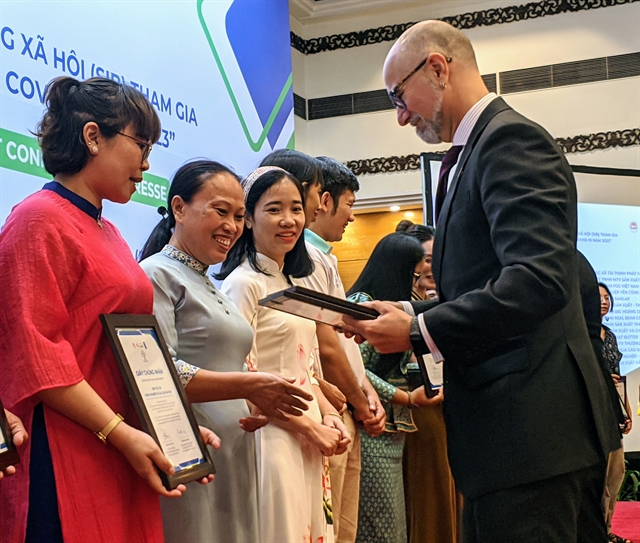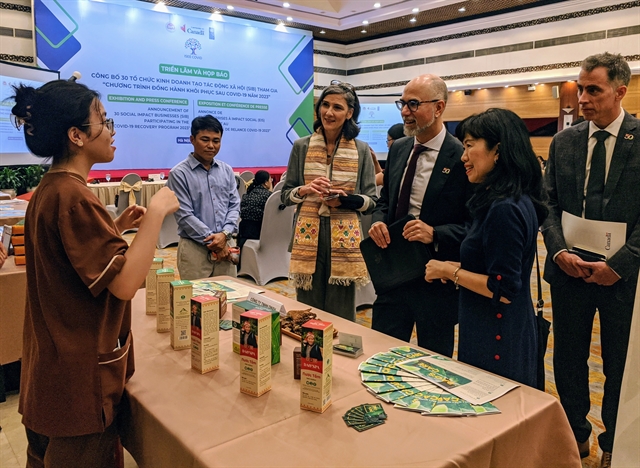 Society
Society

The project aims to enhance the resilience of Vietnamese SIBs and contribute to mitigating the impact of COVID-19 on vulnerable groups, with a particular focus on women and girls.

|
| Shawn Steil, Canadian Ambassador to Việt Nam, grants certificates to SIB's representatives on Thursday. — VNS Photo Khánh Dương |
HÀ NỘI — Thirty Vietnamese social impact businesses (SIBs) have received financial and technical support to transform their business models, innovate their products and navigate the aftermath of COVID-19 under a United National Development Programme (UNDP)-supported project.
They will receive a tailored six-month, one-on-one coaching service along with VNĐ100 million as seed funding under the project “Leveraging Việt Nam’s Social Impact Business Ecosystem in Response to COVID-19” (ISEE-COVID), UNDP announced on Thursday.
The project is also sponsored by Global Affairs Canada and co-implemented by the Agency of Enterprise Development, Vietnamese Ministry of Planning and Investment.
The project aims to enhance the resilience of Vietnamese SIBs and contribute to mitigating the impact of COVID-19 on vulnerable groups, with a particular focus on women and girls.
The 30 SIB finalists range from producing high-quality agricultural products through climate-resilient farming methods to utilising new technology to create decent jobs for persons with disabilities and fostering inclusive education.
Addressing public health is another priority, with SIBs dedicated to healthcare for vulnerable groups and applying technology for cleaner air and a healthier environment.
Three inspiring incubators - BizCare, Wise, and Angle4Us - will be working alongside the SIBs, assisting them in refining their business models, developing new products or services and accelerating their recovery from the pandemic.
UNDP Resident Representative in Việt Nam Ramla Khalidi said last year all of the project’s finalists were able to successfully develop new products or services, maintain or increase their revenue, with some experiencing a remarkable peak increase of 19 times in revenue compared to that of 2021.
She congratulated the SIB finalists this year and expressed her hope that they would take full advantage of the acceleration programme to develop and refine their products and services.

|
| Canadian Ambassador to Việt Nam Shawn Steil and UNDP Resident Representative in Việt Nam Ramla Khalidi visit a SIB's booth showcasing herbal shower gel made by ethnic minority community. — VNS Photo Khánh Dương |
Shawn Steil, Canadian Ambassador to Việt Nam, said: “SIBs’ dedicated efforts play a vital role in addressing social and environmental gaps, making a positive difference in Việt Nam. The SIB sector has demonstrated remarkable resilience, generating employment opportunities for vulnerable and marginalized communities, fostering the development of eco-friendly products, adding value to authentic goods, and enhancing resilience against climate change, among numerous other endeavours that have gained global recognition.
“We trust that SIBs would become successful agents of change, not just for themselves but for their communities and country,” he said.
The herbal detergent production company using biotechnology of Nguyễn Minh Hồng is among 30 SIBs granted support on Thursday in Hà Nội.
Her company is one of the pioneer SIBs in central Đà Nẵng City, applying biotechnology to produce detergents, aiming at waste treatment at source. Her production line has also created jobs for 140 local women living under disadvantaged circumstances over the past seven years.
Hồng said: “The assistance from ISEE-COVID acts as a life-saving buoy that help us recover from COVID-19 and economic downturn. We are also in need of knowledge so the project’s technical support will assist us to develop further.”
“In the future I plan to do research on a type of detergent made from watermelon and will register for intellectual property,” she told Việt Nam News.
Hoàng Thị Huyền Nga, from Will To Live Centre, which receives grant for their Artificial Intelligence (AI)-training project for the disabled, said her centre has worked with a Korean company to offer training and jobs after graduation for disabled students.
70 per cent of the disabled students who graduate from AI-training courses will have jobs with monthly income of VNĐ5-6.5 million, she said.
Nga said the centre will use financial and technical support from ISEE-COVID to expand marketing research and upgrade training equipment. — VNS




